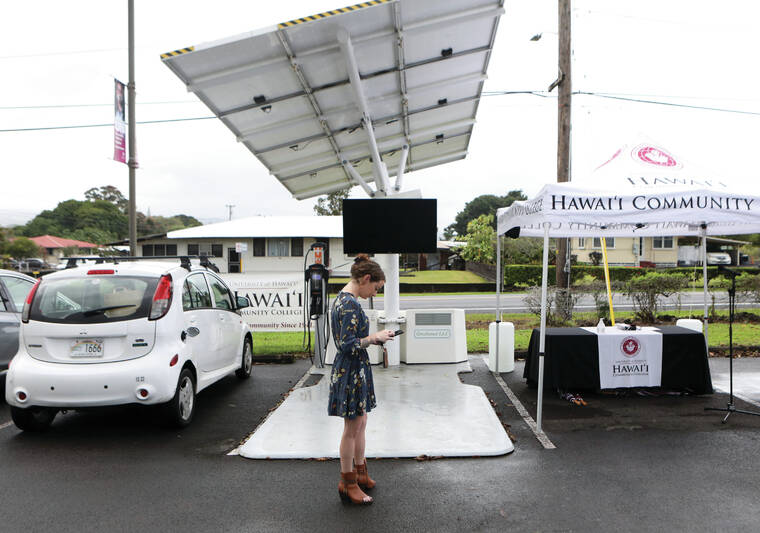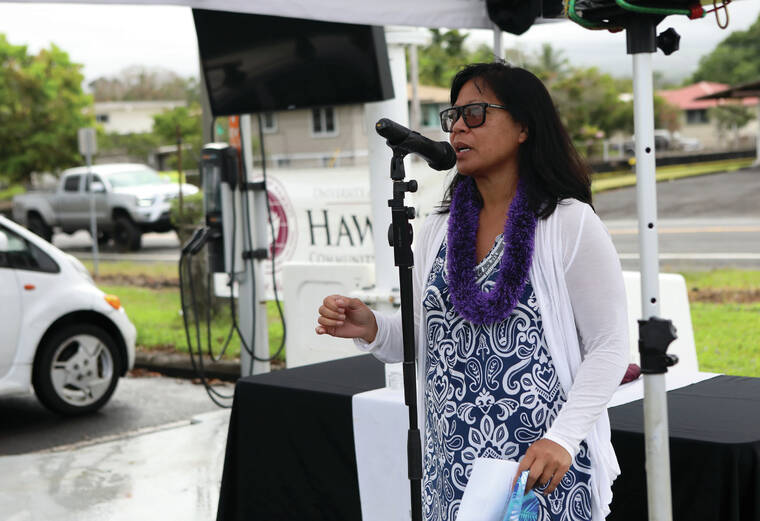Hawaii Community College on Wednesday installed its first electric vehicle charging station at the Manono Street campus in Hilo.
The solar charger follows the installation of eight new EV charging stations at the University of Hawaii at Hilo campus in 2020.
Other EV charging stations are located at the Palamanui campus in Kailua-Kona and the Ko Education Center.
The new Level 2, 240-volt charger is the first portable, solar, off-grid charger on Hawaii Island and will be free for all students, staff and members of the public.
When asked if the college plans on installing additional EV charging stations on campus in the near future, Chancellor Rachel Solemsaas answered “most definitely.”
“We are committed to climate solutions including supporting renewable energy programs,” said Solemsaas, who noted students at the college can now receive an Academic Subject Certificate in sustainability through the newly established Environmental Sustainability Committee.
Headed by Hawaii Community College science instructor Debbie Weeks and Hawaiian Studies instructor Ka‘ea Lyons, the Environmental Sustainability Committee recently completed its first year, culminating in the installation of the new EV charger.
“These courses are taught not just to teach what sustainability is, but to put thought into action,” said Weeks during the unveiling.
UH-Hilo installed eight new EV charging stations back in 2020 via a student-led initiative, bringing the total number of chargers on campus to 10.
Business student Raiatea Arcuri, the UH-Hilo Student Association, and the Auxiliary Services team, including director William Walters, Shannon Asejo, Fred Dela Cruz and Kyle Tsuda, installed the chargers which are free for faculty, staff and students.
“We do want to pursue additional EV stations on campus,” said Interim Vice Chancellor Kalei Rapoza. “Going from two stations on the lower part of campus to 10 stations across campus has been positively received. In the last few years, personal EVs have increased, and the stations nearest to me are typically utilized.”
The state Department of Business, Economic Development &Tourism reported a 33.4% increase in EV sales in 2022, listing 18,923 registered electric passenger vehicles in Hawaii as of March.
The Hawaii Community College charger is a collaboration between the Environmental Sustainability Committee and GreeInvest LLC, a Hawaii-based company working to install EV chargers throughout the Big Island. GreeInvest owns and operates the charger, while the college provides the physical space to host it.
“We are currently gauging how to scale up and deploy more units throughout the island,” said CEO of GreeInvest Michael Ryer, who founded the company in 2020. “The broader mission is to put more solar-powered EV chargers on the island, as it would make use of the island’s sunshine and reduce Hawaii’s dependence on fossil fuels.”
The charger is an EV ARC, capable of providing a 3.8 kilowatt charge through its 4.3 kilowatt solar canopy. It provides 30 miles of driving per one hour of charge, or roughly 225 e-miles per day, depending on weather conditions. The excess charge is stored in a 30 kilowatt battery located at the base of the charger.
Early Childhood Education student Stephanie Carroll was first to utilize the new charger for her eclectic vehicle.
“It’s accessible, it’s on campus, and the fact that it’s solar powered and free for the public is exciting,” Carroll said.
The installation coincides with La Honua Earth Month, a UH initiative that offers more than 40 events for the college and community including trips, virtual symposiums and school garden work days.
“There’s a combination of virtual events and huaka‘i service learning,” said Drew Kapp, coordinator of the La Honua Earth Day Fair and member of the Academic Sustainability Committee. “The theme this year is Wanana i ka Mauliola, which roughly translates to projecting and manifesting a healthy Earth.”
Email Grant Phillips at gphillips@hawaiitribune-herald.com.





